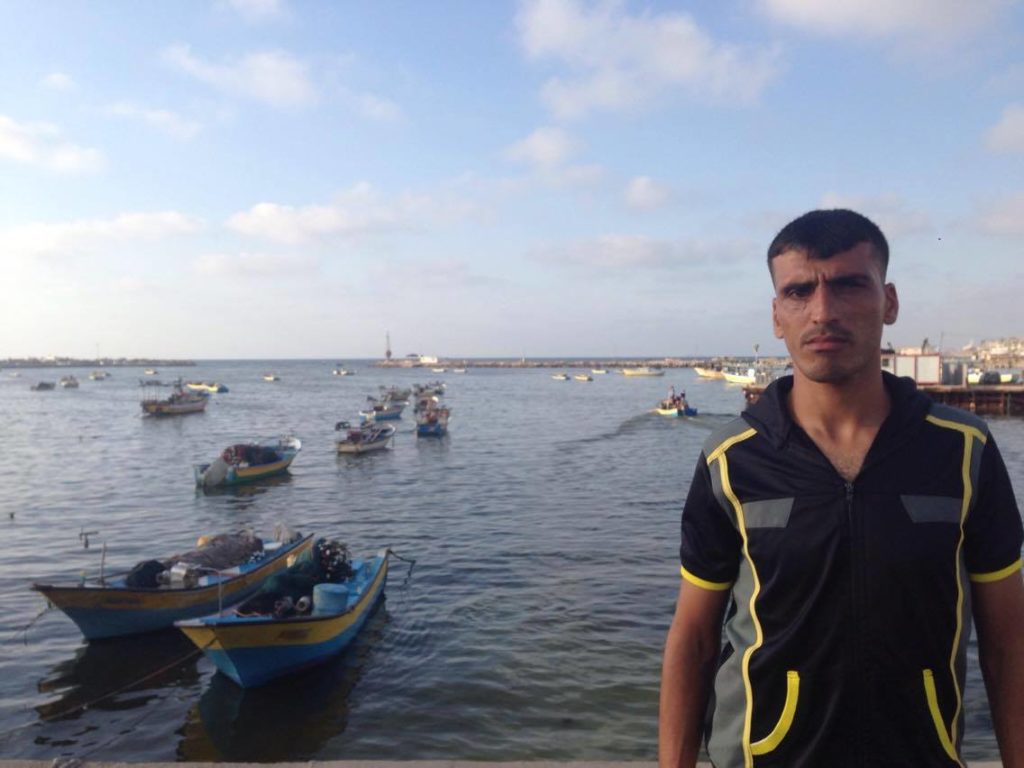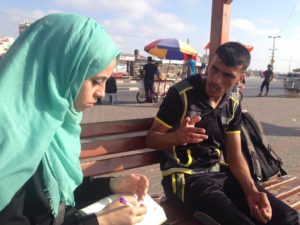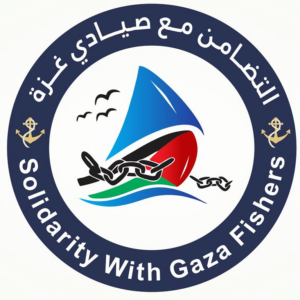By Tarneem Hammad, in Gaza. This article and the video below (The Sea is our Refuge) are from our partners at We Are Not Numbers.

Solidarity with Gaza fishers is proud to introduce an ongoing series featuring the work of these young Palestinian journalists.

I am Rajab Abu Riyala, a fisherman from an early age. I am in love with fishing and I’d l be lying if I said I would rather do another job. The sea is my “talent” and if you take me out of the sea, just like a fish, I’d die. It’s not because I come from a family of fishermen and fishing is our livelihood, no. It’s because of my love of marine life and sailing. Half of my life was spent on Gaza’s sea and the other half on paying the price of the first half.
At the age of 15, I used to work side by side with my father on his boat while studying for my school exams. When I finished my last year at high school, I wished I to further my studies in university. But the odds were not on my side. My dad was getting older and weaker, so I decided to help him and pursue my passion for fishing.
The first time
One day, at 6 a.m. during a cold winter in 2005, my father and I set out to sea off the coast of Rafah for our morning catch. We remained within the Israeli-imposed 12-nautical-mile limit (today, it is much less), but suddenly we saw an Israeli naval boat heading toward us.
“All fishermen! Stop the boats! I said stop the boats or we’ll open fire!” a soldier on the boat boomed at us through a megaphone.
We stopped our boats and what happened next was very humiliating. The soldiers commanded that we take off our clothes and jump into the water, or we’d be shot. Everyone else did, and were taken out of the water and onto the Israeli naval boat with their hands tied and blindfolded. Then they were subjected to hours of investigation, while their boats were confiscated.
But my father and I refused to take off our clothes and give up our catch. We refused to be taken It was very cold and windy; I was wearing three pairs of socks and a rubber suit, but still it felt like I was freezing my tail off.
Israeli soldiers yelled at my father: “I command you to stop the boat now!” My father kept driving our boat and the Israeli navy followed us until our boats crashed. The Israeli soldiers opened fire and I fell off of our boat into the sea. My father managed to pick me up out of the water, and I lay there in pain while still hearing the shots of the Israeli soldiers.

Then the pain worsened and I began screaming, while holding my hands to my chest. My father ripped apart my clothes and found a bullet hit my chest. Words cannot describe the way my father felt or even looked. All I can say is that he flew into a rage and began shouting and throwing stones at the Israeli soldiers while they were still shooting. My father turned on the boat again and the Israeli boat chased us for five kilometers. However, you can’t race a father running for the life of his son.
My dad managed to reach the shore and rush me to Al-Aqsa hospital in Deir Albalah, where I was immediately rushed to the operating room. Doctors removed the bullet and said I was lucky because the injury had penetrated all the way through but failed to puncture my heart. I believe I was lucky because I had a very old but very brave man at my back: my dad my hero.
I fully recovered after two months of medicine and treatment.
The second time
That is, until a few months later. This time, the allowed fishing distance was only nine nautical miles, but I remained within the limit. I was with three other boats in the sea off of Khan Younis. Again, an Israeli naval boat stopped us, commanding us to take off our clothes and jump into the water. One of our crews followed the order, but when it was my turn to do so, I remembered my father’s example. (I was in charge that day, since my dad was too ill to sail with me.) I said, “NO!” It was impossible for me to let all of our sweat and fatigue be in vain. There was no way I would return home empty-handed. So, I continued sailing and the Israeli soldiers chased me, firing toward my boat for 15 minutes until I reached Gaza. But then, all of the sudden, a bullet made it to my knee.
I felt nothing at first, but I saw blood inside my boat. I thoroughly examined myself for any injuries and I saw the wound in my right knee. I turned off the engine and stopped; I could see the shore, but the Israeli soldiers boarded and took me to their boat. A doctor on board bandaged my leg and gave me some pills, which at first I refused to take. But he said it would ease my pain until we get to a hospital, so I did. He was wrong, because the pills eased nothing and I screamed all the way to the occupied town of Asdud (a trip of 42 kilometers).
We finally reached a hospital at 7 a.m., but they chose to leave me bleeding until 5 p.m.
I could take it no more and I shouted, “If you’re going to leave me bleeding, let me go back to Gaza to be treated.” The staff put a splint on my knee, with the bullet still inside, then took me in a jeep to the Erez crossing. From there, I was transferred to Al-Shifa hospital in Gaza City. Doctors there finally removed the bullet and I recovered after five months of treatment. However, I still have some shrapnel inside. I can’t stand the pain in winter, and I limp when it rains.
The last time

Two days later, I woke up in an Israeli hospital. I was told that the bone under my eye was broken, my retina was destroyed and my sinuses also were damaged. But I only wanted to know if I’d be able to see after the gauze was removed. My sight is all I have.
I wanted to call my parents and I wanted to cry an ocean of tears from my one good eye. I begged for seven days to be allowed to call my parents, but I was never permitted to do so. I felt so lonely and weak. After the seventh day, Israeli soldiers transferred me to Erez crossing. There, the Hamas government forced me to stay for an investigation into what had happened that lasted the whole night. (This is normal procedure, since Israel tries to force fishermen to divulge information about the resistance in the Gaza Strip or, even worse, to become spies,)
I have one wish: Give me back my boat. It’s not just a boat to me. It’s my whole life. I spent three years building it piece by piece. I bought the fiberglass and made it with my own hands. It was very fast and strong. I made it to last forever; my wife sold her jewelry so I could finish building and we could live happily ever after. My dream cost me $12,000 and I achieved it, but the Israeli occupation stole it from me.
It’s just a dream now. Without my boat, I can’t work anymore. These days, I’m not able to afford my rent, but the landlord is patient with me. I’m 30 years and I have three children and the fourth is on its way. I love my children and I’m ready to go back to the sea over and over just to draw a smile on their faces. Just give back my life…Give back my boat.
Note: Rajab no longer sees from his right eye. You can help him and others by supporting the Solidarity with Gaza Fishers campaign, a project of the Freedom Flotilla.

















